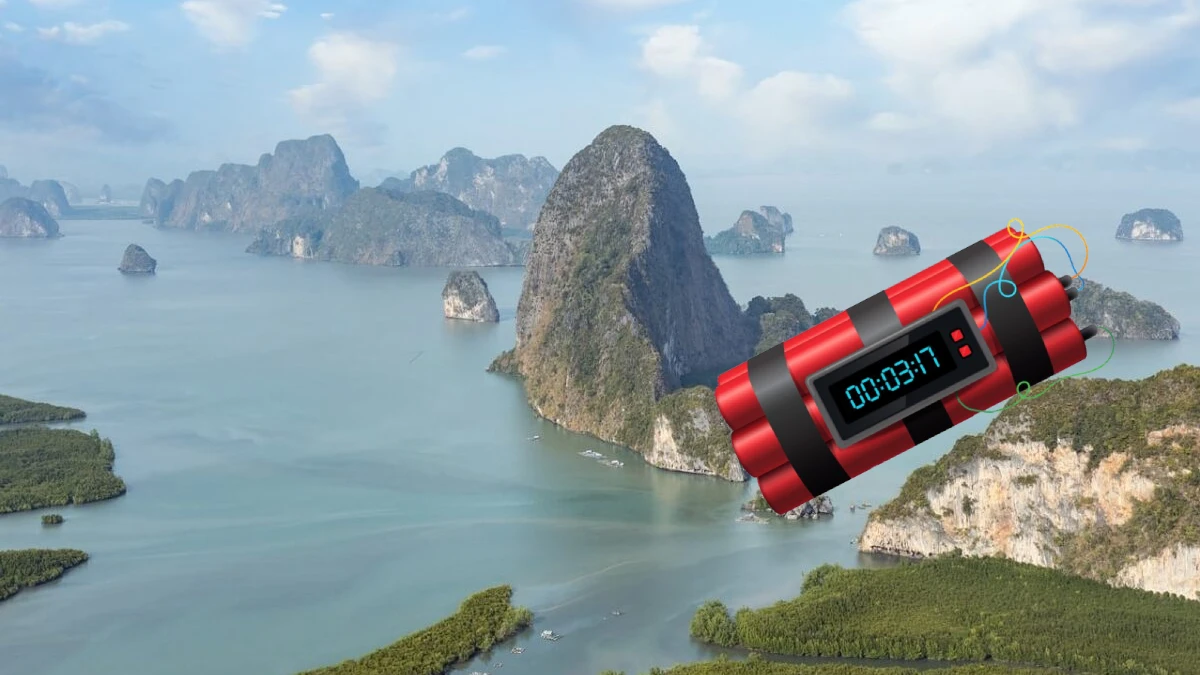In a dramatic early morning operation on June 24, 2025, two men from Pattani province were arrested in Phang Nga, southern Thailand, while allegedly transporting a homemade bomb equipped with a timing device. The incident, which unfolded at a checkpoint near the Phang Nga Provincial Hall, has reignited concerns about security in the region, particularly in connection with the long-running insurgency in Thailand’s deep South. As authorities investigate potential links to militant groups, questions loom over the intended target and the broader implications for stability in a tourist-heavy area like Phuket, the suspects’ apparent destination.
Checkpoint Interception Uncovers Explosive Device
The arrest occurred in the early hours of Tuesday at a bypass intersection in front of the Phang Nga Provincial Hall, a key administrative hub in the southern Thai province. Police from Mueang Phang Nga station, manning a routine checkpoint, flagged down a Honda City after the driver made an abrupt turn upon noticing the officers, raising immediate suspicion. The driver was identified as Muhama Wadeng, 27, and the passenger as Sulaiman Gaza, also 27, both residents of Pattani province, a region historically tied to separatist unrest in Thailand’s southern border provinces.
Upon searching the vehicle, officers discovered what appeared to be a homemade explosive device concealed in a transparent plastic bag within one of the suspects’ personal luggage. The device, equipped with a timer and wired to a mobile Wi-Fi router, was later confirmed by a team of explosive ordnance disposal (EOD) officers to be a functional bomb. The sophisticated setup of the device has alarmed authorities, prompting speculation about its intended use and the technical expertise behind its construction.
According to police reports, the suspects claimed they had been paid to transport the vehicle and the device from Ban Sakom village in Thepha district, Songkhla province, starting their journey at 7 p.m. on Sunday, June 22. They were following a GPS-guided route through Songkhla, Phatthalung, Trang, Krabi, and Phang Nga, with Phuket as their final destination. However, their journey was cut short in Phang Nga, roughly 80 kilometers north of Phuket, a major international tourist hub known for its beaches and nightlife.
Investigation into Southern Insurgency Links
Following the arrest, Pol Lt Gen Surapong Thanomjit, commissioner of Provincial Police Region 8, ordered an immediate investigation to determine whether the suspects and the device are connected to the southern insurgency—a decades-long conflict involving separatist groups in Thailand’s predominantly Muslim southern provinces of Pattani, Yala, and Narathiwat. The insurgency, rooted in ethnic and religious tensions between the Malay-Muslim population and the Thai-Buddhist state, has claimed thousands of lives since flaring up again in 2004. Bombings, assassinations, and ambushes have been common tactics in the conflict, often targeting security forces and government infrastructure.
Authorities are now working with security agencies in the deep South to assess the nature of the device and the suspects’ potential ties to known militant networks. While no group has claimed responsibility for the alleged plot, the use of a timing device and the route through multiple provinces suggest a level of planning that could point to organized activity. If confirmed, this incident could signal an escalation in the insurgency’s reach beyond its traditional strongholds, potentially targeting tourist areas like Phuket—a move that would have significant economic and political repercussions for Thailand.
The suspects’ claim of being paid couriers raises additional questions about who may have orchestrated the operation. Were they unwitting pawns in a larger scheme, or are they directly involved with insurgent factions? Investigators are likely to scrutinize their backgrounds, connections, and communications to uncover the network behind the device’s transport. The involvement of a mobile Wi-Fi router in the bomb’s wiring also suggests a possible intent for remote activation, a tactic that has been used in past attacks in the region.
Security Implications for Southern Thailand
The discovery of a suspected bomb en route to Phuket is particularly concerning given the island’s status as one of Thailand’s most popular tourist destinations, drawing millions of international visitors each year. An attack in such an area would not only endanger lives but also deal a severe blow to Thailand’s tourism industry, which accounts for a significant portion of the country’s GDP. The sector has only recently begun to recover from the impacts of the COVID-19 pandemic, with 2024 seeing a resurgence of visitors to southern provinces like Phang Nga and Phuket.
Phang Nga itself, while less frequented than Phuket, is a gateway to popular coastal destinations and serves as a transit point for travelers heading to the Andaman Sea region. The province’s proximity to the Indian Ocean and its scenic beaches, often visited by tourists as seen on December 26, 2024, make it a soft target for potential disruptions. Any indication that insurgent activities are expanding northward could prompt tighter security measures, including increased checkpoints and surveillance, which may deter visitors and strain local resources.
Moreover, the timing of this arrest comes amid ongoing peace talks between the Thai government and various insurgent factions, mediated in part by Malaysia. While progress has been slow, incidents like this could undermine confidence in the negotiation process and harden positions on both sides. The government may face pressure to adopt a more aggressive stance against suspected militants, while communities in the deep South could experience heightened scrutiny and restrictions, further fueling grievances.
Broader Context of the Southern Conflict
The southern insurgency in Thailand is a complex and deeply rooted conflict, driven by historical marginalization of the Malay-Muslim population in Pattani, Yala, Narathiwat, and parts of Songkhla. These provinces, once part of the independent Sultanate of Patani before being annexed by Thailand in the early 20th century, have long resisted central authority, seeking greater autonomy or outright independence. The conflict intensified in 2004 following a series of violent incidents, including the infamous Tak Bai massacre, where dozens of protesters died in custody after a crackdown by security forces.
Over the past two decades, the insurgency has evolved, with splinter groups like the Barisan Revolusi Nasional (BRN) employing guerrilla tactics against Thai military and civilian targets. While the violence has largely been confined to the deep South, sporadic attacks in other regions—including a 2019 bombing in Bangkok attributed to southern militants—have demonstrated the potential for broader destabilization. The use of improvised explosive devices (IEDs), often hidden in vehicles or public spaces, remains a hallmark of these attacks, making the Phang Nga discovery particularly alarming.
Public sentiment in Thailand remains divided on how to address the conflict. Many in the Buddhist-majority north and central regions view the insurgency as a security threat requiring a firm military response, while others, including human rights advocates, argue for addressing underlying grievances through dialogue and development initiatives. In the deep South, distrust of the central government runs deep, exacerbated by allegations of abuses by security forces and economic neglect of the region.
Regional and International Ramifications
Beyond Thailand’s borders, the Phang Nga arrest could have ripple effects across Southeast Asia, a region already grappling with security challenges ranging from terrorism to transnational crime. Neighboring Malaysia, which shares a border with Thailand’s southern provinces, has a vested interest in preventing spillover violence, as it hosts significant Malay-Muslim communities sympathetic to the Patani cause. Kuala Lumpur has played a facilitating role in peace talks, but any escalation could complicate its position and strain bilateral ties with Bangkok.
Internationally, the incident may draw attention from counterterrorism agencies, particularly if links are established to broader extremist networks. While the southern insurgency is primarily a localized conflict, the potential for foreign fighters or funding to play a role cannot be discounted, especially given the global reach of online radicalization. Western governments, many of whose citizens frequent Thai tourist destinations, may issue travel advisories if the threat level is perceived to rise, further impacting Thailand’s economy.
For now, the focus remains on the ongoing investigation and the immediate security response. Authorities have yet to release detailed findings on the device’s intended target or the suspects’ affiliations, but the arrest serves as a stark reminder of the fragility of peace in southern Thailand. As Pol Lt Gen Surapong Thanomjit and his team delve deeper into the case, the nation watches closely, aware that the outcome could shape security policies and public perceptions for months to come.
As the investigation unfolds, the people of Phang Nga and Phuket remain on edge, hoping for answers that will prevent a potential tragedy. Whether this incident marks a new chapter in the southern conflict or an isolated act, it underscores the enduring challenge of balancing security with the aspirations of a region long caught in the crossfire of history.















